- Home
- Roger Zelazny
The Last Defender Of Camelot Page 3
The Last Defender Of Camelot Read online
Page 3
"How interesting!" he sneered. "How soon is it going to happen?"
What?
"The thing that is causing you to leave."
Oh, that...
I was not certain what to tell him. What could he do, anyhow? Suffer a little more, perhaps."Well?"
My time is up, I told him.
"I see flashes," he said. "Sand and smoke, and a flaming baseball."
He was too sensitive. I thought I had covered those thoughts.
Well... The world is going to end at one o'clock,. ...
"That's good to know. How?"
There is a substratum of fissionable material, which Project Eden is going to detonate. This will produce an enormous chain reaction....
"Can't you do something to stop it?*'
/ don't know how. I don't know what could stop it. My knowledge is limited to the arts and the life-sciences.— You broke your leg when you were skiing in Vermont last winter. You never knew. Things like that, I can manage. ...
"And the horn blows at midnight," he observed.
One o'clock, I corrected. Eastern Standard Time.
"Might as well have another drink," he said, looking at his watch. "Ifs going on twelve."
My question ... I cleared an imaginary throat.
"Oh, yes, what did you want to know?"
—The other half of the tragic response. I've watched you go through it many times, but I can't get at it. I feel the terror part, but the pity—the pity always eludes me.
"Anyone can be afraid," he said, "that part is easy. But you have to be able to get inside people—not exactly the way you do—and feel everything they feel, just before they go smash—so that it feels you're going smash along with them—and you can't do a damn thing about it, and you wish you could—that's pity."
Oh? And being afraid, too?
"—and being afraid. Together, they equal the grand catharsis of true tragedy."
He hiccupped.
And the tragic figure, for whom you feel these things? He must be great and noble, mustn't he?
"True," he nodded, as though I were seated across the room from him, "and in the last moment when the unalterable jungle law is about to prevail,, he must stare into the faceless mask; of God, and bear himself, for thatbrief moment, above the pleas of his nature and the course of events." We both looked at his watch.
**What time will you be leaving?" In about fifteen minutes.
**Good. You have time to listen to a record while I dress."
He switched on his stereo and selected an album.
I shifted uneasily.
// it isn't too long....
He regarded the jacket.
"Five minutes and eight seconds. I've always maintained that it is music for the last hour of Earth."
He placed it on the turntable and set the arm.
"If Gabriel doesn't show up, this will do."
He reached for his tie as the first notes of Miles Davis* Saefa limped through the room, like a wounded thing climbing a hill.
He hummed along with it as he reknotted his tie and' combed his hair. Davis talked through an Easter my with a tongue of brass, and the procession moved before us: Oedipus and blind Gloucester stumbled by, led by Antigone and Edgar—Prince Hamlet gave a fencer's salute and plunged forward, whUe black Othello lumbered on behind—Hippolytus, all in white, and the Duchess of Malfi, sad, paraded through memory on a thousand stages.
Phillip buttoned his jacket as the final notes sounded, and shut down the player. Carefully rejacketting the record, he placed it among his others.
What are you going to do?
**Say good-bye. There's a party up the street I hadn*t planned on attending. I believe I'll stop in for a drink. Good-bye to you also.
"By the way," he asked, "what is your name? I've known you for a long time, I ought to call you something now.'*
He suggested one, half-consciously. I had never really had a name before, so I took it.
Adrastea, I told him.
He smirked again.
**No thought is safe from you, is it? Good-bye."
Good-bye.
He closed the door behind him, and I passed throughthe ceilings and floors of the apartments overhead, then up, and into the night above the city. One eye in the building across the street winked out; as I watched, the other did the same.
Bodiless again, I fled upward wishing there was something I could feel.
HE WHO SHAPES
This is the original novella for which they gave me a Nebula Award at that first, very formal SFWA banquet at the Overseas Press Club, and which I expanded at Damon Knight's suggestion into the book The Dream Master. The novel contains some material which I am very happy to have written, but reflecting upon things after the passage of all this time I find that I prefer this, the shorter version. It is more streamlined and as such comes closer to the quasi-Classical notions I had in mind, in terms of economy and directness, in describing a great man with a flaw.
Lovely as it was, with the blood and all. Render could sense that it was about to end.
Therefore, each microsecond would be better off as a minute, he decided—and perhaps the temperature should be increased ... Somewhere, just at the periphery of everything, the darkness halted its constriction.
Something, like a crescendo of subliminal thunders, was arrested at one raging note. That note was a distillate of shame and pain and fear.
The Forum was stifling.
Caesar cowered outside the frantic circle. His forearm covered his eyes but it could not stop the seeing, not this time.
The senators had no faces and their garments were spattered with blood. All their voices were like the cries of birds. With an inhuman frenzy they plunged their daggers into the fallen figure.
All, that is, but Render.The pool of blood in which he stood continued to widen. His arm seemed to be rising and falling with a mechanical regularity and his throat might have been shaping bird-cries, but he was simultaneously apart from and a part of the scene.
For he was Render, the Shaper.
Crouched, anguished and envious, Caesar wailed his protests.
"You have slain him! You have murdered Marcus Antonius—a blameless, useless fellow!"
Render turned to him and the dagger in his hand was quite enormous and quite gory.
"Aye," said he.
The blade moved from side to side. Caesar, fascinated by the sharpened steel, swayed to the same rhythm.
"Why?" he cried. "Why?"
"Because," answered Render, "he was a far nobler Roman then yourself.**
"You lie* It is not sol"
Render shrugged and returned to the stabbing.
"It is not true!" screamed Caesar. "Not truel"
Render turned to him again and waved the dagger. Puppetlike, Caesar mimicked the pendulum of the blade.
"Not true?" smiled Render. "And who are you to question an assassination such as this? You are no one! You detract from the dignity of this occasion! Begone!"
Jerkily, the pink-faced man rose to his feet, his hair half-wispy, half-wetplastered, a disarray of cotton. He turned, moved away; and as he walked, he looked back over his shoulder.
He had moved far from the circle of assassins, but the scene did not diminish in size. It retained an electric clarity. It made him feel even further removed, ever more alone and apart.
Render rounded a previously unnoticed corner and stood before him, a blind beggar.
Caesar grasped the front of his garment.
"Have you an ill omen for me this day?"
"Beware!" jeered Render.
"Yest Yes!" cried Caesar. "'Bewarel' That is good! Beware what?"
"The ides—" ^Yes? The ides—?-
"—of Octember."He released the garment.
"What is that you say? What is Octember?"
"A month."
"You liel There is no month of Octemberi"
"And that is the date noble Caesar need fear—the "non-existent time, the never-t
o-be-calendared occasion."
Render vanished around another sudden corner.
"Wait! Come backl"
Render laughed, and the Forum laughed with him. The bird-cries became a chorus of inhuman jeers.
"You mock me!" wept Caesar.
The Forum was an oven, and the perspiration formed like a glassy mask over Caesar's narrow forehead, sharp nose and chinless jaw.
"I want to be assassinated tool" he sobbed. "It isn't fairl"
And Render tore the Forum and the senators and the grinning corpse of Antony to pieces and stuffed them into a black sack—with the unseen movement of a single finger—and last of all went Caesar.
Charles Render sat before the ninety white buttons and the two red ones, not really looking at any of them. His right arm moved in its soundless sling, across the lap-level surface of the console—pushing some of the buttons, skipping over others, moving on, retracing its path to press the next in the order of the Recall Series.
Sensations throttled, emotions reduced to nothing, Representative Erikson knew the oblivion of the womb.
There was a soft click.
Render's hand had glided to the end of the bottom row of buttons. An act of conscious intent—will, if you like—was required to push the red button.
Render freed his arm and lifted off his crown of Medusa-hair leads and microminiature circuitry. He slid from behind his desk-couch and raised the hood. He walked to the window and transpared it, fingering forth a cigarette.
One minute in the ro-womb, he decided. No more. This is a crucial one... . Hope it doesn't snow till later— those clouds look mean....
It was smooth yellow trellises and high towers, glassy and gray, all smouldering into evening under a shalecolored sky; the city was squared volcanic islands, glow-ing in the end-of-day light, rumbling deep down under the earth; it was fat, incessant rivers of traffic, rushing.
Render turned away from the window and approached the great egg that lay beside his desk, smooth and glittering. It threw back a reflection that smashed all aquilinity from his nose, turned his eyes to gray saucers, transformed his hair into a light-streaked skyline; his reddish necktie became the wide tongue of a ghoul.
He smiled, reached across the desk. He pressed the second red button.
With a sigh, the egg lost its dazzling opacity and a horizontal crack appeared about its middle. Through the now-transparent shell. Render could see Erikson grimacing, squeezing his eyes tight, fighting against a return to consciousness and the thing it would contain. The upper half of the egg rose vertical to the base, exposing him knobby and pink on half-shell When his eyes opened he did not look at Render. He rose to his feet and began dressing. Render used this time to check the ro-womb.
He leaned back across his desk and pressed the buttons: temperature control, full range, check; exotic sounds—he raised the earphone—check, on bells, on buzzes, on violin notes and whistles, on squeals and moans, on traffic noises and the sound of surf; check, on the feedback circuit—holding the patient's own voice, trapped earlier in analysis; check, on the sound blanket, the moisture spray, the odor banks; check, on the couch agitator and the colored lights, the taste stimulants ...
Render closed the egg and shut off its power. He pushed the unit into the closet, palmed shut the door. The tapes had registered a valid sequence.
"Sit down," he directed Erikson.
The man did so, fidgeting with his collar.
"You have full recall," said Render, "so there is no need for me to summarize what occurred. Nothing can be hidden from me. I was there."
Erikson nodded.
"The significance of the episode should be apparent to you."
Erikson nodded again, finally finding his voice. "But was it valid?" he asked. "I mean, you constructed the dream and you controlled it, all the way. I didn't reallydream it—in the way I would normally dream. Your ability to make things happen stacks the deck for whatever you're going to say—doesn't it?"
Render shook his head slowly, flicked an ash into the southern hemisphere of his globe-made-ashtray, and met Erikson's eyes.
"It is true that I supplied the format and modified the forms. You, however, filled them with an emotional significance, promoted them to the status of symbols corresponding to your problem. If the dream was not a valid analogue it would not have provoked the reactions it did. It would have been devoid of the anxiety-patterns which were registered on the tapes.
"You have been in analysis for many months now," he continued, "and everything I have learned thus far serves to convince me that your fears of assassination are without any basis in fact."
Erikson glared.
"Then why the hell do I have them?"
"Because," said Render, "you would like very much to be the subject of an assassination."
Erikson smiled then, his composure beginning to return.
"I assure you, doctor, I have never contemplated suicide, nor have I any desire to stop living."
He produced a cigar and applied a flame to it. His band shook.
"When you came to me this summer," said Render, "you stated that you were in fear of an attempt on your life. You were quite vague as to why anyone should want to kill you—"
"My position! You can't be a Representative as long as I have and make no enemies!"
"Yet," replied Render, "it appears that you have managed it. When you permitted me to discuss this with your detectives I was informed that they could unearth nothing to indicate that your fears might have any real foundation. Nothing."
"They haven't looked far enough—or in the right places. They'll turn up something."
"I'm afraid not."
"Why?"
"Because, I repeat, your feelings are without any objective basis. —Be honest with me. Have you any infor-mation whatsoever indicating that someone hates you enough to want to kill you?"
"I receive many threatening letters... .**
"As do all Representatives—and all of those directed to you during the past year have been investigated and found to be the work of cranks. Can you offer me one piece of evidence to substantiate your claims?'*
Erikson studied the tip of his cigar.
"I came to you on the advice of a colleague," he said, "came to you to have you poke around inside my mind to find me something of that sort, to give my detectives something to work with. —Someone I've injured severely perhaps—or some damaging piece of legislation I've dealt with ..."
**—And I found nothing," said Render, "nothing, that is, but the cause of your discontent. Now, of course, you are afraid to hear it, and you are attempting to divert me from explaining my diagnosis—"
"I am not!"
*Then listen. You can comment afterward if you want, but you've poked and dawdled around here for months, unwilling to accept what I presented to you in a dozen different forms. Now I am going to tell you outright what it is, and you can do what you want about it."
"Fine."
"First," he said, "you would like very much to have an enemy or enemies—"
"Ridiculous!"
**—Because it is the only alternative to having friends—"
**I have lots of friends!"
**—Because nobody wants to be completely ignored, to be an object for whom no one has really strong feelings. Hatred and love are the ultimate forms of human regard. Lacking one, and unable to achieve it, you sought the other. You wanted it so badly that you succeeded in convincing yourself it existed. But there is always a psychic pricetag on these things. Answering a genuine emotional need with a body of desire-surrogates does not produce real satisfaction, but anxiety, discomfort—because in these matters the psyche should be an open system. You did not seek outside yourself for human regard. You were closed eff. You created that which you needed from the stuff ofyour own being. You are a man very much in need of strong relationships with other people."
"Manure 1"
'Take it or leave it," said Render. '*! suggest you take it."
"I've been paying you for half a year to help find out who wants to kill me. Now you sit there and tell me I made the whole thing up to satisfy a desire to have someone hate me."
"Hate you, or love you. That's right."
"It's absurd! I meet so many people that I carry a pocket recorder and a lapel-camera, just so I can recall them all...."
"Meeting quantities of people is hardly what I was speaking of. —Tell me, did that dream sequence have a strong meaning for you?"
Erikson was silent for several tickings of the huge wallclock.
"Yes," he finally conceded, "it did. But your interpretation of the matter is still absurd. Granting though, just for the sake of argument, that what you say is correct—what would I do to get out of this bind?"
Render leaned back in his chair.
"Rechannel the energies that went into producing the thing. Meet some people as yourself, Joe Erikson, rather than Representative Erikson. Take up something you can do with other people—something non-political, and perhaps somewhat competitive—and make some real friends or enemies, preferably the former. I've encouraged you to do this all along."
"Then tell me something else."
-Gladly."
"Assuming you are right, why is it that I am neither liked nor hated, and never have been? I have a responsible position in the Legislature. I meet people all the time. Why am I so neutral a—thing?"
Highly familiar now with Erikson's career. Render had to push aside his true thoughts on the matter, as they were of no operational value. He wanted to cite him Dante's observations concerning the trimmers—those souls who, denied heaven for their lack of virtue, were also denied entrance to hell for a lack of significant vices—in short, the ones who trimmed their sails to move them with every wind of the times, who lacked direction, who were notreally concerned toward which ports they were pushed. Such was Erikson's long and colorless career of migrant loyalties, of political reversals.
Render said:
"More and more people find themselves in such circumstances these days. It is due largely to the increasing complexity of society and the depersonalization of the individual into a sociometric unit. Even the act of cathecting toward other persons has grown more forced as a result. There are so many of us these days."

 Seven Tales in Amber
Seven Tales in Amber Frost and Fire
Frost and Fire Doorways in the Sand
Doorways in the Sand Unicorn Variation
Unicorn Variation A Night in the Lonesome October
A Night in the Lonesome October Madwand
Madwand Jack Of Shadows
Jack Of Shadows Lord of Light
Lord of Light The Doors of His Face, The Lamps of His Mouth and Other Stories
The Doors of His Face, The Lamps of His Mouth and Other Stories Guns Of Avalon tcoa-2
Guns Of Avalon tcoa-2 Coils
Coils The Last Defender Of Camelot
The Last Defender Of Camelot Creatures of Light and Darkness
Creatures of Light and Darkness This Immortal
This Immortal Trumps of doom tcoa-6
Trumps of doom tcoa-6 The Dream Master
The Dream Master The Complete Dilvish, The Damned
The Complete Dilvish, The Damned Nine Princes in Amber
Nine Princes in Amber If at Faust You Don't Succeed
If at Faust You Don't Succeed Here there be dragons
Here there be dragons The Doors Of His Face, The Lamps Of His Mouth
The Doors Of His Face, The Lamps Of His Mouth The Great Book of Amber - Chronicles 1-10
The Great Book of Amber - Chronicles 1-10 Madwand (Illustrated)
Madwand (Illustrated) The Chronicles of Amber
The Chronicles of Amber To Die In Italbar
To Die In Italbar The Changing Land
The Changing Land The Furies
The Furies Nine Princes In Amber tcoa-1
Nine Princes In Amber tcoa-1 Last Of The Wild Ones
Last Of The Wild Ones Sign of the Unicorn tcoa-3
Sign of the Unicorn tcoa-3 My Name is Legion
My Name is Legion Wizard World 1: Changeling
Wizard World 1: Changeling Changeling
Changeling The Shroudling and the Guisel (amber stories)
The Shroudling and the Guisel (amber stories) The Mask of Loki
The Mask of Loki A Farce To Be Reckoned With
A Farce To Be Reckoned With Roadmarks
Roadmarks When Pussywillows Last in the Catyard Bloomed (rtf)
When Pussywillows Last in the Catyard Bloomed (rtf) Hall of Mirrors (amber stories)
Hall of Mirrors (amber stories) Permafrost
Permafrost Changeling (Illustrated)
Changeling (Illustrated) Donnerjack
Donnerjack Shadows & Reflections: A Roger Zelazny Tribute Anthology
Shadows & Reflections: A Roger Zelazny Tribute Anthology The Courts Of Chaos tcoa-5
The Courts Of Chaos tcoa-5 Flare
Flare Doorsways in the Sand
Doorsways in the Sand The Great Book of Amber
The Great Book of Amber Home Is the Hangman
Home Is the Hangman For a Breath I Tarry
For a Breath I Tarry Isle Of The Dead
Isle Of The Dead Salesman Tale (amber stories)
Salesman Tale (amber stories) Dismal Light
Dismal Light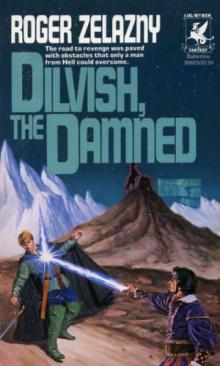 Dilvish, The Damned
Dilvish, The Damned The Black Throne
The Black Throne Wizard World 2: Madwand
Wizard World 2: Madwand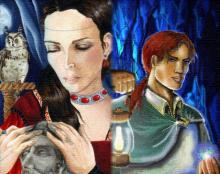 The Salesman's Tale
The Salesman's Tale